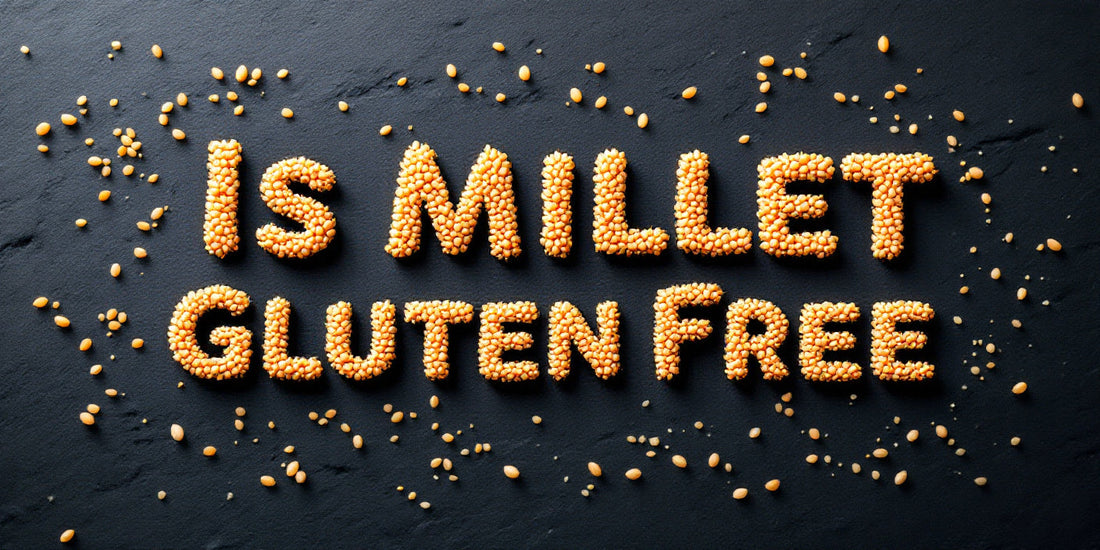

Is Millet Gluten Free? Exploring the Truth and Benefits
Table of Contents
If you're someone who is health-conscious or follows a gluten-free diet, you might have wondered, is millet gluten free? This ancient grain has been gaining popularity due to its amazing health benefits and easy-to-cook nature. But the burning question for most people remains: is millet gluten free or not?
Well, you're in the right place! In this blog, we'll dive deep into understanding millet, whether or not it's gluten-free, the health benefits of millet, how to incorporate it into your diet, and everything else you need to know about this super grain. So, let's uncover the truth!
What is Millet?
Before we answer the question, is millet gluten free, let's understand what millet actually is.
Millet is a small, round whole grain that belongs to the Poaceae family, commonly known as the grass family. It's widely grown in India, Africa, and other parts of Asia. Millet has been consumed for thousands of years and is now recognized globally for its nutritional benefits.
The different types of millet include:
- Pearl Millet
- Foxtail Millet
- Finger Millet (Ragi)
- Sorghum (Jowar)
- Little Millet
- Proso Millet
- Kodo Millet
These grains are incredibly versatile, making them a popular choice for porridge, flatbreads, pancakes, and even fermented drinks.

Is Millet Gluten Free?
The answer is a BIG YES! Millet is naturally gluten free, making it a perfect choice for individuals with celiac disease, gluten intolerance, or those who simply want to eliminate gluten from their diet.
Gluten is a protein found in wheat, barley, rye, and their derivatives. However, millet does not contain gluten, which means it won't trigger any gluten-related disorders. So, if you've been wondering, is millet gluten free, rest assured that it absolutely is!
In fact, millet is often recommended as a gluten-free substitute for wheat, making it a healthier and safer option.
Why is Gluten-Free Important for Some People?
Now that we've answered the question, is millet gluten free, let's quickly understand why avoiding gluten is important for some individuals.
1. Celiac Disease
Celiac disease is an autoimmune disorder where consuming gluten can damage the small intestine, leading to nutrient malabsorption and various digestive issues. People with celiac disease MUST avoid gluten completely.
2. Gluten Sensitivity
Some people may not have celiac disease but are still sensitive to gluten. They may experience bloating, indigestion, fatigue, or other discomforts after consuming gluten. Millet being gluten free becomes an excellent option for them.
3. Health Benefits
Even for people without any gluten intolerance, switching to a gluten-free diet can have several health benefits such as better digestion, reduced inflammation, and improved energy levels.
Health Benefits of Millet
Since we've established that millet is gluten free, let's talk about the amazing health benefits that come with consuming millet.
1. Rich in Nutrients
Millet is loaded with essential nutrients like fiber, protein, magnesium, phosphorus, and iron. This makes it a power-packed grain for overall health improvement.
2. Improves Digestion
Since millet is gluten free, it’s easy to digest and light on the stomach. The high fiber content also promotes healthy digestion, reduces constipation, and boosts gut health.
3. Helps in Weight Loss
Yes! Millet can help you shed those extra kilos. Its low-calorie, high-fiber content keeps you full for a longer time, reducing your overall calorie intake.
4. Regulates Blood Sugar
Millet has a low glycemic index, which means it doesn’t spike your blood sugar levels. This makes it ideal for people with diabetes or those who want to maintain stable blood sugar levels.
5. Strengthens Immunity
Packed with antioxidants and essential nutrients, millet helps boost your immune system, keeping you protected from various diseases.
6. Heart Health
Since millet is gluten free and high in fiber, it helps lower bad cholesterol levels, keeping your heart healthy and reducing the risk of cardiovascular diseases.
How to Include Millet in Your Gluten-Free Diet?
The best part about millet being gluten free is that you can incorporate it into your daily diet very easily. Here are some creative ways to enjoy millet:
- Millet Porridge: Cook millet with water or milk and add your favorite fruits and nuts for a healthy breakfast.
- Millet Upma: Prepare savory upma using foxtail millet, vegetables, and spices.
- Millet Roti: Replace wheat flour with millet flour to make gluten-free rotis or flatbreads.
- Millet Pancakes: Use millet flour to make delicious and healthy pancakes.
- Millet Rice: Substitute rice with cooked millet in your meals.
The options are endless when it comes to enjoying millet in your gluten-free diet.

Is Millet Flour Gluten Free?
A common follow-up question people often ask is: Is millet flour gluten free?
The answer is YES. Millet flour is gluten free just like whole millet. If you have gluten intolerance or celiac disease, you can confidently use millet flour to prepare various dishes like:
- Millet Chapati
- Millet Pancakes
- Millet Biscuits
- Millet Cakes
- Millet Bread
Just ensure that your millet flour is not processed in a facility that handles wheat or other gluten-containing grains to avoid cross-contamination.
Is Millet Safe for Celiac Disease?
Absolutely! Millet is 100% safe for individuals with celiac disease or severe gluten intolerance. In fact, many health experts recommend including millet in the diet of celiac patients due to its high nutrient content and gluten-free nature.
Just remember to double-check the packaging to ensure there is no cross-contamination during processing.
Final Answer: Is Millet Gluten Free?
So, after all the research and understanding, we can confidently say that yes, millet is gluten free. It is an excellent choice for anyone looking to avoid gluten, improve their digestion, boost their immunity, or simply eat healthier.
If you've been hesitant about trying millet, now is the time to incorporate it into your diet. You can experiment with different recipes, from millet porridge to millet rotis, and enjoy the amazing health benefits it offers.

















